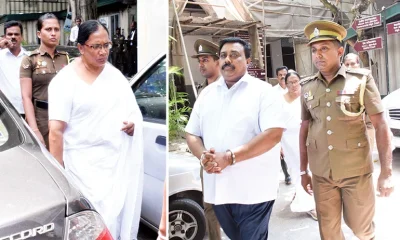Foreign News
Maldives president visits India amid trouble in tourist paradise
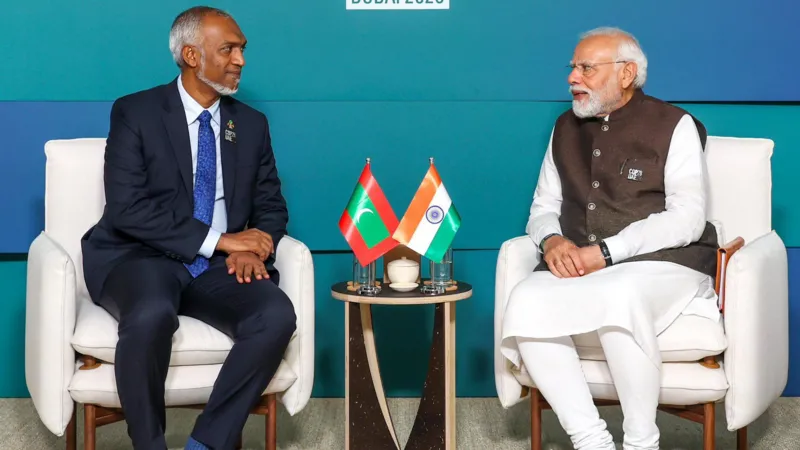
Maldivian President Mohamed Muizzu is expected to seek a bailout during his visit to India this week as the archipelago nation stares at an economic crisis with fears of debt default.
It’s Muizzu’s first official bilateral visit after he was voted to power late last year following a campaign centred on an ‘India out’ policy, with a promise to reduce Delhi’s influence.
Since then, ties have been strained between the countries but experts say the visit indicates that the Maldives can’t afford to ignore its giant neighbour.
The foreign exchange reserves of the Maldives stood at about $440m (£334m) in September, just enough for one-and-a-half months of imports.
Last month, global agency Moody’s downgraded the Maldives’ credit rating, saying that “default risks have risen materially”.
An Indian bailout will bolster the country’s foreign currency reserves.
Before visiting India, Muizzu chose to travel to Turkey and China – his visit to the latter in January was seen as a high-profile diplomatic snub to Delhi as previous Maldivian leaders first visited Delhi after being elected. Around the same time, a controversy erupted in India after three Maldivian officials made derogatory comments about Prime Minister Narendra Modi.
“President Muizzu’s visit is a turnaround in several ways,” says Azim Zahir, a Maldives analyst and lecturer at the University of Western Australia.
“Most notably, the visit is a realisation of how dependent the Maldives is on India, a dependency that no other country will find easy to fill,” he says.
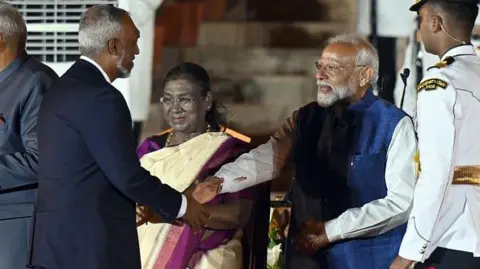
The Maldives consists of about 1,200 coral islands and atolls located in the middle of the Indian Ocean. The archipelago has a population of about 520,000 compared to India’s 1.4 billion.
As a small island nation, the Maldives depends on its giant neighbour India for most of its food, infrastructure building and healthcare.
Delhi and Male have not officially confirmed that a financial package for the Maldives is on the agenda during the visit. But experts believe it will be part of the discussion.
“The key priority of Muizzu’s visit is to secure a financial helpline in the form of grant-in-aid and restructuring debt repayments,” a senior Maldivian editor, who did not want to be identified, told the BBC.
Muizzu also wants a “$400m currency swap deal sought by the Maldives central bank to shore up depleted foreign exchange reserves”, he added.
The ratings agency Moody’s further expressed serious concerns over Male’s financial situation, saying that “(foreign) reserves remain significantly below the government’s external debt service of around $600m in 2025 and over $1bn in 2026”.
The public debt of the Maldives is about $8bn, including about $1.4bn it owes each to China and India.
“Despite Muizzu stating on several occasions that China has given a green signal for deferring debt payments for five years, financial assistance from Beijing has not been forthcoming,” the Maldivian editor said.
With no other country coming to the rescue, it appears that Muizzu is now reaching out to India to mend strained ties.
“It’s about resetting the tone and negative rhetoric from senior officials of Muizzu’s government that has considerably impacted Indian tourist arrivals,” says Zahir.
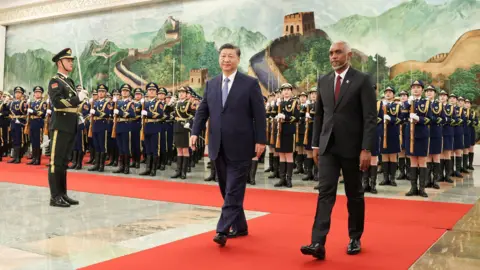
India has long wielded influence over the Maldives, whose strategic position in its backyard allowed it to monitor a crucial part of the Indian Ocean. But Muizzu wanted to change that by moving closer to China.
In January, Muizzu’s administration gave an ultimatum to India to withdraw about 80 troops based in the country. Delhi said they were stationed there to man and operate two rescue and reconnaissance helicopters and a Dornier aircraft it had donated years ago.
In the end, both countries agreed to replace troops with Indian civilian technical staff to operate the aircraft.
A month after assuming charge, Muizzu’s administration also announced that it would not renew a hydrographic survey agreement with India that was signed by the previous government to map the seabed in the Maldivian territorial waters.
Then a row broke out after three of his deputy ministers made controversial comments about Modi, calling him a “clown”, “terrorist” and a “puppet of Israel”.
The remarks set off an uproar and calls to boycott the Maldives on Indian social media. Male said the comments were personal and did not represent the views of the government. The three ministers were suspended from the cabinet.
In what was seen as a thinly-veiled criticism of the reaction on Indian social media, Muizzu said at the time: “We may be small, but that doesn’t give you the licence to bully us.”
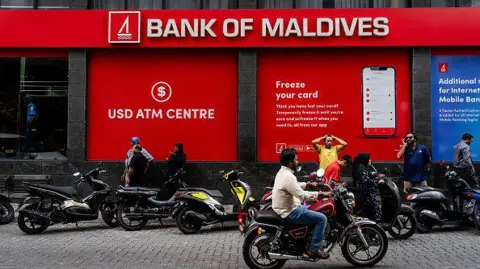
Muizzu’s administration also allowed the port call of a Chinese research ship, Xiang Yang Hong 3, much to Delhi’s displeasure. Some saw it as a mission to collect data which could – at a later date – be used by the Chinese military in submarine operations.
Nevertheless, there was a thaw in bilateral ties after Muizzu attended the swearing-in ceremony of Modi after he was elected for a third consecutive term in June this year.
In August, Indian Foreign Minister S Jaishankar’s visit also gave a reboot to bilateral ties. “The Maldives is one of the cornerstones of our ‘Neighbourhood First’ policy,” Jaishankar said in Male. “To put it succinctly in the words of my Prime Minister Narendra Modi – for India, neighbourhood is a priority and, in the neighbourhood, Maldives is a priority,” he added.
For Delhi, it’s a welcome change as it recently witnessed the ouster of the India-friendly government of former prime minister Sheikh Hasina in Bangladesh and the return of KP Sharma Oli, who used to criticise India’s policies, as the prime minister of Nepal.
Muizzu has realised that antagonising India is not an option and his pragmatism is not without reason. The number of Indian tourists visiting the Maldives dropped by 50,000 in the past year, resulting in an estimated loss of about $150m.
He is aware if he doesn’t get financial support from India, the Maldives could become a paradise lost. That’s why his India visit is crucial.
[BBC]
Foreign News
Myanmar military announces temporary truce as quake death toll passes 3,000
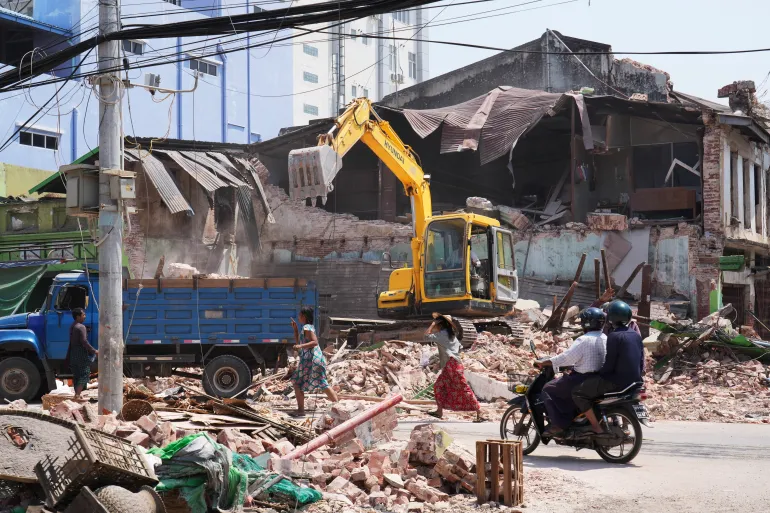
Myanmar’s governing military has declared a unilateral, temporary ceasefire in the country’s civil war to facilitate rescue efforts after last week’s powerful earthquake, as state television reported the death toll from the disaster had surpassed 3,000.
MRTV said that the truce would last from Wednesday until April 22 and was aimed at making quake relief efforts easier.
The announcement followed unilateral temporary ceasefires announced by armed resistance groups opposed to military rule. Those groups must refrain from attacking the state, or regrouping, or else the military will take “necessary” measures, the army said in a statement.
The death toll from the earthquake in Myanmar rose to 3,003, and more than 4,500 were injured, MRTV reported late on Wednesday.
In neighbouring Thailand, the death toll from the quake rose to 22, with hundreds of buildings damaged and 72 people missing.
In an incident underlining the challenge of delivering relief at a time of civil war in Myanmar, the military said its troops fired warning shots after a Chinese Red Cross convoy failed to pull over as it travelled in a conflict zone.
The Chinese Ministry of Foreign Affairs told the media that its rescue team and supplies were safe after the incident on Tuesday.
Guo Jiakun, a ministry spokesperson, said at a news conference that Beijing hoped “all factions and parties in Myanmar will prioritise earthquake relief efforts, ensuring the safety of rescue personnel and supplies from China and other countries”.
“It’s necessary to keep transportation routes for relief efforts open and unobstructed,” Guo said.

Military government spokesperson Zaw Min Tun said the Chinese Red Cross had not informed authorities it was in a conflict zone on Tuesday night, and a security team fired shots in the air after the convoy, which included local vehicles, failed to stop.
The military has struggled to run Myanmar following its coup against the elected civilian government of Nobel laureate Aung San Suu Kyi in 2021, reducing the economy and basic services, including healthcare, to tatters after civil war broke out.
The United Nations said more than 28 million people in the six regions were affected by the earthquake and that it put in place $12m in emergency funding for food, shelter, water, sanitation, mental health support and other services.
As hopes of finding more survivors were fading on Wednesday, rescuers pulled two men alive from the ruins of a hotel in Myanmar’s capital, Naypyidaw, and a third from a guesthouse in another city – five days after the magnitude 7.7 quake. But most teams were finding only bodies.
The rural parts of the hard-hit Sagaing region, mostly under the control of armed resistance groups fighting the military government, are among the most challenging for aid agencies to reach.
Earlier, Human Rights Watch urged the military government to allow unfettered access for humanitarian aid and lift curbs impeding aid agencies, saying donors should channel aid through independent groups rather than only the authorities.
“Myanmar’s junta cannot be trusted to respond to a disaster of this scale,” Bryony Lau, deputy Asia director at Human Rights Watch, said in a report. “Concerned governments and international agencies need to press the junta to allow full and immediate access to survivors, wherever they are.”
[Aljazeera]
Foreign News
Death sentence for three Americans over DR Congo coup attempt overturned
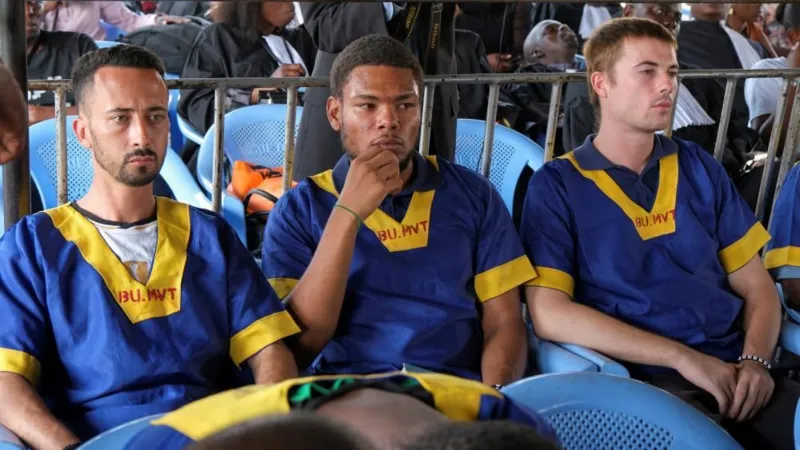
Three Americans convicted for their role in a failed coup in Democratic Republic of Congo last year have had their death sentences commuted to life imprisonment, the presidency has said.
They were among 37 people sentenced to death last September by a military court.
The three were accused of leading an attack on both the presidential palace and the home of an ally of President Félix Tshisekedi last May.
The overturning of the sentences comes ahead of a visit to DR Congo by the newly appointed US senior advisor for Africa, Massad Boulos.
Boulos, father-in-law to President Donald Trump’s daughter, Tiffany, is expected to arrive in Kinshasa on Thursday on a trip that will also take him to Rwanda, Kenya and Uganda.
The US has not declared the three Americans to be wrongfully jailed in DR Congo but the State Department said previously there have been talks between the countries over the matter.
The three were convicted of criminal conspiracy, terrorism and other charges, which they denied.
[BBC]
Foreign News
Netanyahu nominates new Israeli spy chief despite court order
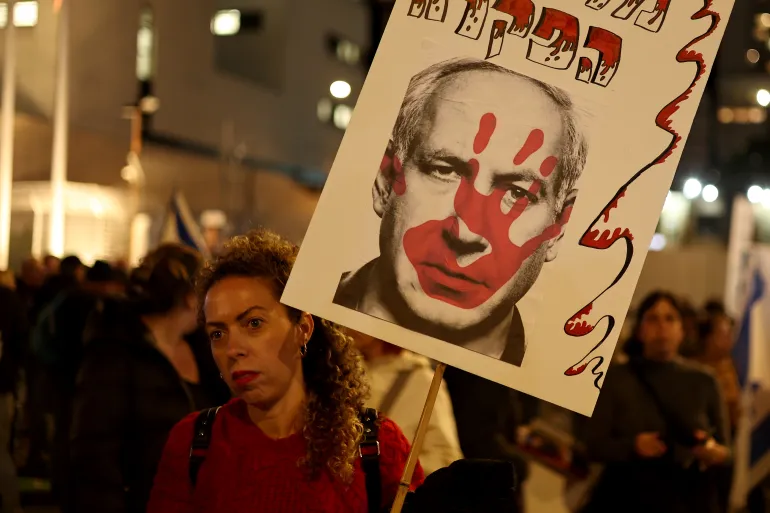
Israeli Prime Minister Benjamin Netanyahu has nominated a former Navy commander to head the country’s domestic security services, despite the courts having blocked his bid to fire the previous head of Shin Bet.
Netanyahu’s office announced on Monday that he had nominated Vice Admiral Eli Sharvit to lead the agency, which surveils attacks from abroad and at home, including by armed groups based in Palestine and Lebanon. However, a halt to the sacking of Ronen Bar as head of Shin Bet, ordered by the Supreme Court, remains in place.
[Aljazeera]
-

 Sports4 days ago
Sports4 days agoSri Lanka’s eternal search for the elusive all-rounder
-

 News3 days ago
News3 days agoBid to include genocide allegation against Sri Lanka in Canada’s school curriculum thwarted
-

 News5 days ago
News5 days agoGnanasara Thera urged to reveal masterminds behind Easter Sunday terror attacks
-

 Business6 days ago
Business6 days agoAIA Higher Education Scholarships Programme celebrating 30-year journey
-

 News4 days ago
News4 days agoComBank crowned Global Finance Best SME Bank in Sri Lanka for 3rd successive year
-

 Features4 days ago
Features4 days agoSanctions by The Unpunished
-

 Features4 days ago
Features4 days agoMore parliamentary giants I was privileged to know
-

 Latest News2 days ago
Latest News2 days agoIPL 2025: Rookies Ashwani and Rickelton lead Mumbai Indians to first win










